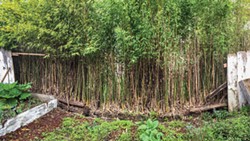[
{
"name": "Top Stories Video Pair",
"insertPoint": "7",
"component": "17087298",
"parentWrapperClass": "fdn-ads-inline-content-block",
"requiredCountToDisplay": "1"
}
]
I recently received an interesting question from NCJ staff writer Linda Stansberry, and it seemed like a great topic for this month's column. She writes:
"I just bought a house whose lovely raised garden beds are being strangled by invasive bamboo. What can I do?"
First off, let me say that bamboo is a grass. And like Bermuda grass, Couch grass, and most other rhizomatous plants, it can be almost impossible to control without extreme measures. A lot of people think that if they choose "clumping" varieties of bamboo, they won't spread. But in my experience this just isn't true. Bamboo is a wonderful shade plant, privacy screen and evergreen hedge. But it should always be considered a permanent plant and, especially when dealing with a well-established section, you have to accept that it will dominate the space in which it was planted.
So here are your options:
Kill it:
The only way to completely kill bamboo is by using a super toxic herbicide. This will kill your bamboo but you will still have to dig it all out. And there is still a chance that some of the rhizomes will survive and attempt to re-establish. If you are diligent, and continue to dig and apply the poison, after a few years the bamboo should be gone for good. I am not in any way recommending this option, as we all know that herbicides are terrible for you and for the planet. But it is an option, nonetheless.
Fight it:
Say the bamboo has invaded your nice raised garden beds. Since those beds were likely filled with fluffy, fertile garden soil, I am sure the bamboo was delighted to find such an easy, receptive medium, and is probably growing quite well all through those beds. To fight it, you will have to dig out what you can find, lay down landscape cloth (or tin roofing!) and rebuild your beds on top. This, however, will only provide a temporary relief from the rhizomes, and you will have to repeat the process every year or two. You can also try to dig a deep trench all around the edge of the bamboo and put in a thick plastic barrier. But again, the bamboo will probably win, eventually.
Use it:
Most varieties of bamboo produce edible, nutritious shoots. The leaves can be used in tea, and the beautiful stalks can be used in a wide range of crafts and construction projects. Those shoots that are popping up in your garden beds can be dug out, potted, and sold for a good price to a local nursery or via craigslist. As much as your stand of bamboo is annoying to you at this point, it is still a beautiful, useful plant and there is a good market for it. Build yourself some veggie beds somewhere else on your property, well away from the bamboo, and let your problem become your solution!
Finally, a word to the wise:
When you plant perennials into your landscape, please consider their size at maturity. You wouldn't plant a redwood tree in an area that would eventually cause it to shade out your entire vegetable garden, would you? With trees, this is usually obvious. But with shrubs, hedges and giant grasses like bamboo, people often don't think it through. Bamboo, holly, laurel, wild rose marionberry, to name a few, should be considered large, permanent plantings that will need plenty of space in perpetuity. Before you plant them, measure the area and make sure you are making a good choice. And please, think of the neighbors! Don't plant bamboo along the property line unless you have talked to the person on the other side of the fence and made sure they want to share the burden (and the beauty) of your decision.
Good luck!
Got a garden related question? Submit your queries and relevant photos to [email protected]. If Heather Jo Flores has a solution, we'll print it in the Journal.
Heather Jo Flores wrote Food Not Lawns, How to Turn Your Yard into a Garden and Your Neighborhood into a Community, which contains bushels of information about how to grow a diverse organic garden that replenishes nature while filling your belly. Learn more at www.foodnotlawns.com.
Comments (5)
Showing 1-5 of 5
more from the author
-
Tales from the Underground
A rainbow of roots from around the world
- Sep 21, 2017
-
Hashtag, Bumper Crop
Veggies to plant now for fall and winter
- Aug 17, 2017
-
Plotting Out Your Garden: Part 2
- Apr 6, 2017
- More »


































